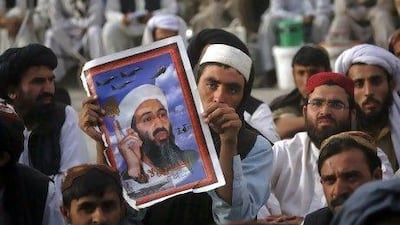Osama bin Laden was preoccupied with the mounting challenges his terrorist organisation faced, including its dismal perception among Muslims, internal divisions on strategy and a new generation of online militants who even senior leadership considered dangerously fanatical.
More than 6,000 documents were seized during the raid on his Pakistan hideout in Abbottabad a year ago, but only 175 of them were recently declassified and released by Washington on Thursday through the Army's Combating Terrorism Center. They offer a rare and tantalising - although limited - snapshot of the inner workings of Al Qaeda's top leadership as it debated how to bring its subordinates in line and on message.
Many of the letters by bin Laden and other leaders suggest a concerted effort to rebrand the organisation, in part by exerting greater control over its affiliates' disregard for Muslim civilian casualties and their loose and self-serving interpretations of Islamic law.
Bin Laden and his lieutenants worried that these excesses by the Pakistani Taliban and Al Shabab in Somalia, for example, were dangerously counterproductive to Al Qaeda's overall strategy. In a letter to the Pakistani Taliban, Al Qaeda commanders condemned "killing more people, taking them as shields without basing their action on the Sharia, killing the normal Muslims as a result of martyrdom operations that takes place in the marketplaces, mosques, roads, assembly places, and calling the Muslims apostates".
In many instances, the letters called for a renewed focus on American targets and less on local operations that could kill Muslim civilians.
A letter from Al Qaeda's media strategist Adam Gadhan, a US citizen, also showed an ambivalence towards the younger generation of online militants and a worry that their bigotry was causing Muslims to turn away. "As for the Jihadi forums, it is repulsive to most of the Muslims, or closed to them. It also distorts the face of Al Qaeda, due to what you know of bigotry," he wrote.
Leah Farrall, a terrorism analyst and research associate at the University of Sydney, said: "bin Laden's suggestions regarding a renewed media and education campaign were in part in response to concerns like [Gadhan's] … and part of the effort to bring people back into the fold and act more in accordance with Al Qaeda's strategy. It's always about control."
And while the documents showed that there was a contested relationship between Al Qaeda's core leaders and its major affiliates in Africa, Yemen, Iraq and Pakistan, there was still operational cooperation, perhaps more than analysts previously thought. The Al Qaeda affiliate in Yemen asked bin Laden about promoting the American cleric Anwar Al Awlaki, and bin Laden chastised the group on failing in its media spin.
In response to the Al Awlaki request, he wrote a polite but pointed request: "How excellent would it be if you ask brother Basir to send us the resume, in detail and lengthy, of brother Anwar al-'Awlaqi, as well as the facts he relied on when recommending him, while informing him that his recommendation is considered".
Bin Laden was also greatly interested in the developments of the Arab Spring. Until now, analysts had mainly focused on how the turmoil in the Middle East was a setback for Al Qaeda, but Daveed Gartenstein-Ross, a terrorism analyst at the Center for the Study of Terrorist Radicalisation at the Foundation for Defense of Democracies, a Washington-based think tank, said that in bin Laden's mind, "there was more promise than peril for Al Qaeda" in the Arab Spring.
Of the uprisings, Bin Laden wrote: "what we are witnessing these days of consecutive revolutions is a great and glorious event, and it is most probable, according to reality and history, that it will encompass the majority of the Islamic world with the will of Allah, and thanks to Allah things are strongly heading towards the exit of Muslims from being under the control of America, and the Americans worry about that, which is great."
Bin Laden even sent directions to commanders about what to do with militants who were itching to get back home and join the national struggles.
Mr Gartenstein-Ross said the documents also show a greater amount of strategic pragmatism on Al Qaeda's part than most western analysts realise.
In a letter to an Al Shabab leader, bin Laden said a formal alliance would be bad for Somalia because it would make it more difficult for NGOs and aid groups to do their work. He also wrote that declaring an independent Islamic state would be a mistake because citizens demand services from their governments and Al Qaeda was unprepared for that.
Analysts warned that the documents be considered cautiously because they were such a small sample of the overall data and were released selectively. "I am certainly not saying that they represent a lie, but in other ways they're slanted… they were selected for particular reason to push particular narratives," Mr Gartenstein-Ross said.
The Associated Press journalist Matt Apuzzo, who has writte about the documents, put it another way on Twitter: "Drawing conclusions about Al Qaeda from these docs is like letting your ex-girlfriend go thru all your emails and choose 17 to release."
Beyond what the documents may suggest about Al Qaeda's thinking a year ago and more, they may also tell us something about the future and the effect that killing rather than capturing bin Laden may have on the organisation.
"It is very clear [that bin Laden was] trying to control acts of violence that fall outside of what he views as morally acceptable, but also that are counterproductive to Al Qaeda's strategic agenda," said Ms Farrall.
Bin Laden's killing "and the generational change we are beginning to see in the core and in a number of subsidiaries has the makings of creating a power vacuum where more extremism grows."

